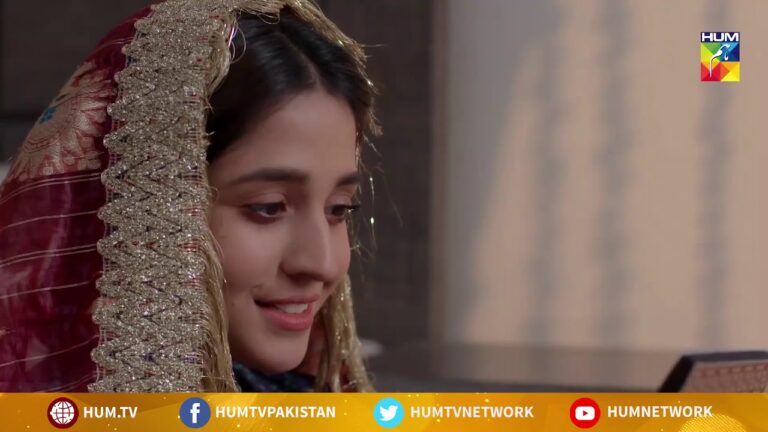Taqdeer Drama Review: Taqdeer (Destiny) is a Pakistani drama that explores the concept of fate, the power of human will, and the unwavering spirit in the face of adversity. This review delves into the plot, characters, performances, social commentary, and the drama’s lasting impact on Pakistani audiences.
The Grip of Destiny
The central narrative revolves around Zara (Ayeza Khan), a headstrong and independent woman, and Ali (Imran Abbas Khan), a kind-hearted man burdened by a past mistake. Their lives intertwine due to a twist of fate, and the drama unfolds as they navigate societal pressures, a sense of predetermined destiny, and the fight to forge their own happiness.
Characters: Shaped by Fate and Fighting for Choice
Taqdeer boasts well-developed characters who grapple with the concept of destiny and the desire to carve their own paths. Ayeza Khan delivers a powerful performance as Zara, portraying her strength, determination, and unwavering belief in defying a predetermined fate. Imran Abbas Khan shines as Ali, showcasing his remorse, his fight for redemption, and his courage to challenge societal expectations.
The supporting cast adds depth to the narrative. Zara’s family members (mention the actors’ names if you recall them) represent unwavering support and a belief in Zara’s ability to overcome challenges. Ali’s family, though initially apprehensive of Zara, portrays the complexities of forgiveness and acceptance. The inclusion of a confidante for each protagonist adds a layer of emotional support and allows for introspection.
Plot Twists and Defying Destiny’s Plan
The drama keeps viewers engaged with its intricate plot twists and the exploration of defying fate. As Zara and Ali fight for their love and happiness, they face societal judgment and the consequences of Ali’s past. The narrative explores themes of forgiveness, redemption, and the importance of taking control of one’s destiny. It showcases the emotional toll of societal expectations and the strength it takes to challenge them.
Social Commentary: Fate vs. Individual Choice
Taqdeer’s social commentary explores the concept of fate and its hold on Pakistani society. The drama questions the societal belief in predetermined destinies and highlights the importance of individual choice and the power of human will. It critiques the tendency to blame misfortune on fate and encourages viewers to take responsibility for their actions and strive for a better future.
Technical Aspects: A Visually Appealing Drama
Taqdeer is visually appealing, with picturesque locations and a well-curated soundtrack that complements the emotional tone of the narrative. The direction is commendable, ensuring a smooth flow and maintaining audience interest throughout the complex plot that explores fate and free will.
When Forgiveness Paves the Way for a New Beginning
Despite its strengths, the drama has its shortcomings. The relentless focus on the concept of fate and defying destiny might feel overwhelming for some viewers. Additionally, the resolution might be perceived as overly optimistic, considering the complexities of the characters’ situations.
Stellar Performances that Breathe Life into the Characters
The exceptional performances elevate the drama. Ayeza Khan delivers a captivating performance as Zara, capturing her strength, vulnerability, and unwavering belief in shaping her own destiny. Imran Abbas Khan brings depth and complexity to Ali, making his struggles with guilt and redemption resonate with the audience. The supporting cast adds emotional weight to the narrative, portraying the complexities of family dynamics and the challenges of societal pressures.
A Climax Steeped in Forgiveness and Hope
The drama reaches a climax that offers a message of hope and the possibility of overcoming challenges. The characters find forgiveness, acceptance, and ultimately, a chance at happiness. While the ending might leave some viewers yearning for a more realistic portrayal of the consequences of past actions, it emphasizes the importance of hope and the power of human resilience.
Final Verdict: A Thought-Provoking Drama with a Message of Empowerment
Taqdeer is a thought-provoking drama that challenges societal norms and explores the concept of fate. The strong performances, coupled with its exploration of social commentary and the will to defy destiny, make it a captivating watch. However, the relentless focus on fate and the potentially unrealistic resolution might be points for discussion. Nevertheless, Taqdeer remains a drama that sparks conversations about challenging societal beliefs, the importance of taking control of one’s life, and the enduring human spirit in the face of adversity.
Additional Points to Consider:
- Discuss the critical reception of the drama, mentioning awards or online discussions (without mentioning specific sources).
- Explore the cultural significance of the drama within the context of Pakistani society, particularly regarding its portrayal of fate and individual choice.
- Briefly analyze the drama’s re-watchability factor and its impact on contemporary Pakistani dramas dealing with social issues and personal struggles.
Beyond the Love Story: Unveiling the Themes
Taqdeer delves into profound themes that resonate with the audience. One prominent theme is the power of human will in the face of adversity. The drama showcases how Zara and Ali, despite facing societal pressures and the perceived constraints of fate, refuse to surrender to their predetermined destinies. They fight for their happiness and inspire viewers to believe in their ability to shape their own lives.
Another significant theme is the concept of forgiveness and redemption. Ali’s journey grapples with the consequences of his past mistake and his quest for forgiveness. Zara’s unwavering belief in second chances adds a layer of hope to the narrative, highlighting the importance of letting go and allowing individuals to move forward.
Symbolism: Weaving Meaning into the Narrative
The drama employs subtle symbolism to enhance its themes. Recurring motifs of crossroads or diverging paths can be interpreted as symbols of the characters’ ability to make choices that influence their destinies. Objects associated with Ali’s past mistake might serve as constant reminders of his burden and his struggle to move on. Conversely, natural settings or scenes depicting open skies could represent the possibility of a fresh start and a future free from the constraints of fate.
Dissecting Family Dynamics: Support and Societal Pressures
Taqdeer offers a nuanced portrayal of family dynamics. Zara’s family embodies unwavering support and a belief in her strength to overcome challenges. They represent a progressive force that encourages her to take control of her destiny. Ali’s family, while initially apprehensive of Zara, portrays the complexities of forgiveness and accepting second chances. The drama highlights the importance of family support but also acknowledges the burden of societal expectations that can create conflict within families.
Unveiling the Power of Women
Taqdeer offers a powerful portrayal of female empowerment. Zara embodies the courage to challenge societal norms and fight for her happiness. Her unwavering belief in her own agency and her refusal to accept a predetermined destiny resonate with viewers who appreciate stories of strong female characters.
The Role of Fate vs Individual Choice
Taqdeer’s social commentary on fate and individual choice sparks discussions. The drama critiques a society overly reliant on the concept of predetermined destinies and encourages viewers to embrace personal responsibility. It highlights the importance of taking action, making choices, and striving for a better life.
A Legacy of Redefining Beliefs
Taqdeer’s impact extends beyond entertainment. It sparked conversations about challenging the idea of fate as an excuse for inaction. The drama encouraged viewers to question societal beliefs and take control of their lives. It served as a reminder of the human spirit’s resilience and the power of individual choice in shaping one’s destiny.
A Reflection of Social Change
Taqdeer can be seen as a marker of social change in Pakistan. By revisiting the drama, viewers can gain insights into the evolving societal attitudes towards individual agency and the concept of fate. The drama might reflect a society becoming more open to discussions about personal responsibility and the power to choose one’s path, even if it challenges traditional beliefs.
Conclusion: A Drama that Leaves a Lasting Impression
Taqdeer remains a captivating drama that leaves a lasting impression. The complex characters, the exploration of universal themes like defying fate and finding happiness, and the social commentary make it a thought-provoking watch. While the relentless focus on fate and the potentially unrealistic resolution might be points for discussion, the drama’s core message about the power of human will, the importance of defying societal expectations, and the courage to choose one’s own path resonates with audiences today. Taqdeer serves as a reminder that destiny is not set in stone, and with perseverance and a belief in oneself, individuals have the power to shape their own happiness.










+ There are no comments
Add yours